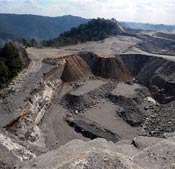A new study from the Journal of Community Health concludes that cancer rates in areas of Appalachia where mountaintop removal mining (MTR) is taking place are more than twice as high as areas that are not near MTR sites. According to the study, as many as 60,000 individual cancer cases can be linked directly to exposure from MTR debris.
As reported on Alternet, the study was the first of its kind to involve a door-to-door questionnaire, where researchers used community members’ own stories and medical records to determine the results. These door-to-door interviews were conducted in mountaintop removal mining areas, as well as non-coal mining counties for use as a control.
From the Alternet report:
According to the new study: “The odds for reporting cancer were twice as high in the mountaintop mining environment compared to the non mining environment in ways not explained by age, sex, smoking, occupational exposure, or family cancer history.” The study found:
Surface water and ground water around MTM activity are characterized by elevated sulfates, iron, manganese, arsenic, selenium, hydrogen sulfide, lead, magnesium, calcium and aluminum; contaminates severely damage local aquatic stream life and can persist for decades after mining at a particular site ceases. In addition, elevated levels of airborne particulate matter around surface mining operations include ammonium nitrate, silica, sulfur compounds, metals, benzene, carbon monoxide, polycyclic aromatic hydrocarbons, and nitrogen dioxide.
Citing extremely high levels of uterine and ovarian, skin, urinary, bone, brain, and others forms of cancers, the study additionally noted:
Arsenic, for example, is an impurity present in coal that is implicated in many forms of cancer including that of skin, bladder and kidney. Cadmium is linked to renal cancer. Diesel engines are widely used at mining sites, and diesel fuel is used for surface mining explosives, coal transportation and coal processing; diesel exhaust has been identified as a major environmental contributor to cancer risk.
The findings of this new study are especially alarming when paired with a recent study about the increasing number of birth defects in MTR areas. The birth defect study, conducted by researchers at Washington State University and West Virginia University, found that birth defects were 26% more likely to be seen in children that had been exposed to MTR wastes while in the womb.
DeSmogBlog reported in a January 2010 post about another study of the impacts of MTR on health:
A group of the nation’s leading environmental scientists is calling on the U.S. Environmental Protection Agency and the U.S. Army Corps of Engineers to stop issuing new mountaintop mining permits, arguing that the ecological and human health costs of the controversial mining practice are “pervasive and irreversible.” …
Along with this environmental devastation, the authors confirm major impacts on human health in the Appalachian region, including “elevated rates of mortality, lung cancer, and chronic heart, lung and kidney disease in coal producing communities” according to the study.
As Jeff Biggers on Alternet put it, these studies show that MTR is not only an environmental threat, but now poses a serious, documented threat to human health.
Subscribe to our newsletter
Stay up to date with DeSmog news and alerts







